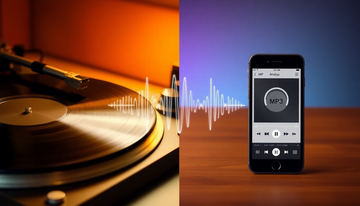In the digital age, where music is readily available at our fingertips, the debate between vinyl records and MP3s continues to rage on. While the convenience of streaming and downloading music has become the norm, many audiophiles and music enthusiasts swear by the superior sound quality of vinyl. But is this claim truly justified? In this blog post, we'll explore the differences between vinyl records and MP3s, and determine which one offers the better sound quality.
The Science Behind Sound Quality
To understand the differences in sound quality, we need to delve into the science behind how these two formats store and reproduce audio. Vinyl records use an analog format, where the grooves on the record physically represent the waveform of the original sound. As the needle of the turntable moves through these grooves, it captures the subtle nuances and details of the music, resulting in a warm, rich, and immersive listening experience.
On the other hand, MP3s are a digital format, where the original sound is converted into a series of binary data. This process, known as digitization, involves sampling the audio at a specific rate and quantizing the amplitude of the sound waves. While modern MP3 encoders have become increasingly sophisticated, there is an inherent loss of information during the digitization process, which can lead to a perceived reduction in sound quality.
The Debate: Vinyl vs. MP3
One of the primary arguments in favor of vinyl is the superior dynamic range and frequency response. Vinyl records are capable of capturing a wider range of frequencies, from the deep, rumbling bass to the delicate high-end details. This results in a more natural and lifelike sound, with a greater sense of depth and dimension.
In contrast, MP3s are often criticized for their limited dynamic range and frequency response. The compression algorithms used to create MP3 files can result in the loss of subtle nuances and the flattening of the overall sound. This can be particularly noticeable in genres such as classical, jazz, and acoustic music, where the nuances and dynamics are essential to the listening experience.
Another factor to consider is the issue of noise and distortion. Vinyl records, while susceptible to surface noise and scratches, can often produce a more organic and natural-sounding noise floor, which some listeners find to be a part of the overall listening experience. MP3s, on the other hand, can sometimes exhibit a more artificial and digital-sounding noise floor, which can be perceived as less pleasing to the ear.
The Importance of Playback Equipment
It's important to note that the quality of the playback equipment can also have a significant impact on the perceived sound quality. A high-quality turntable and amplifier can make a world of difference in the listening experience of a vinyl record, while a poorly designed or low-quality MP3 player or headphones can diminish the sound quality of digital audio.
In the case of vinyl, the quality of the record itself, the condition of the stylus, and the alignment of the tonearm can all play a crucial role in the overall sound quality. Proper maintenance and care of the vinyl and turntable are essential for achieving the best possible listening experience.
For MP3s, the quality of the encoding process, the bitrate, and the audio codec used can all impact the sound quality. Higher bitrate MP3s, such as 320kbps, can offer a more satisfying listening experience than lower bitrate versions, but they still may not match the depth and nuance of a well-mastered vinyl record.
The Subjective Nature of Sound Quality
Ultimately, the debate between vinyl and MP3s comes down to personal preference and subjective experience. Some listeners may prefer the warm, analog sound of vinyl, while others may find the convenience and portability of digital audio to be more appealing.
It's important to remember that sound quality is not a purely objective measure. Different listeners may have different preferences and sensitivities when it comes to audio quality. What one person perceives as superior sound quality may not be the same for another.
Conclusion
In the end, the choice between vinyl records and MP3s comes down to personal preference and the specific listening environment. While vinyl records may offer a more immersive and nuanced listening experience, MP3s have the advantage of convenience and portability.
Ultimately, the best way to determine which format offers the better sound quality is to experience both for yourself. Attend a live music event, visit a high-end audio store, or invest in a quality turntable and vinyl collection. Explore the differences and decide which format resonates with you the most.
Regardless of your preference, the joy of music lies in the emotional connection and the ability to appreciate the artistry and creativity of the musicians. Whether you're listening to vinyl or MP3s, the most important thing is to embrace the music and let it transport you to new and exciting sonic landscapes.






